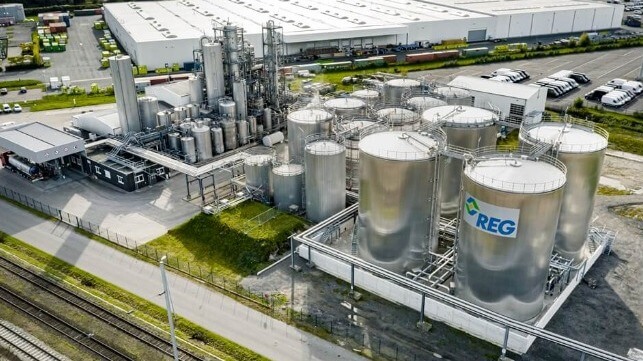Interview: Chevron's Robert Wolf on the Growing Popularity of Biofuel

Biofuel is one of the simplest options available for vessel operators to lower emissions today, without waiting for new equipment or new technology. According to the Global Centre for Maritime Decarbonisation, biofuel can cut net carbon emissions by 20 percent (for a typical 30 percent biofuel / 70 percent MGO blend). Formulations for marine diesel engines are available in many major ports, and the fuel's popularity is rising among operators and charterers who want to control emissions right away.
For more information, TME recently caught up with Robert Wolf, Senior Manager Strategic Initiatives at Chevron-owned Renewable Energy Group, a leading producer and distributor of biofuel bunkers.
Where is the maritime industry at today with the uptake of biofuels? Is it moving beyond a trial phase?
I think trialing is not needed anymore, specifically on the technology side. It's now more about the pricing and the commitment from the shipowners.
Fuel costs are very important to the cost structure of each shipowner. The general approach is still that they take what is needed in order to either fulfill their customer demand, fulfill regulation, or fulfill their own carbon reduction targets that they have as a company. But price is always a discussion point. There's nobody who says, "let's take a B100 [100% blend] and I'll pay the premium." Unfortunately, it doesn't work like that yet.
The general range of blends used in the market today is somewhere between a B20 and a B50, depending on the incentive structure. The Dutch government has a very interesting incentive structure, so there we see that the B30 and B50 are being used a lot. In Singapore, it's B24.
Where are your production sites for biofuel?
We have 11 production facilities for biofuels in total. 10 of those are biodiesel plants and one is for renewable diesel. They're predominantly in the Midwest.
There is a lot of additional renewable diesel production volume that is anticipated to come online in the US in the next couple of years. Also in the past few months, you see the same kind of investments going into Europe. These production facilities are coming online in combination with production of sustainable aviation fuel, or SAF, which has much tighter tolerances for quality.
What are the challenges ahead for meeting the global demand for biofuel?
The main challenge is about the efficient allocation of the global supply of biofuel feedstocks. And I think that that should be done based on energy input and on environmental impact.
That is something that we as a renewable fuels producer are actively lobbying with government. We want to make sure that the government has a view that you can only use one feedstock molecule once. And it needs to be allocated in such a way that all different kind of lower carbon fuel solutions will have the right allocation for the future, because the world needs it all. - TME
The opinions expressed herein are the author's and not necessarily those of The Maritime Executive.

